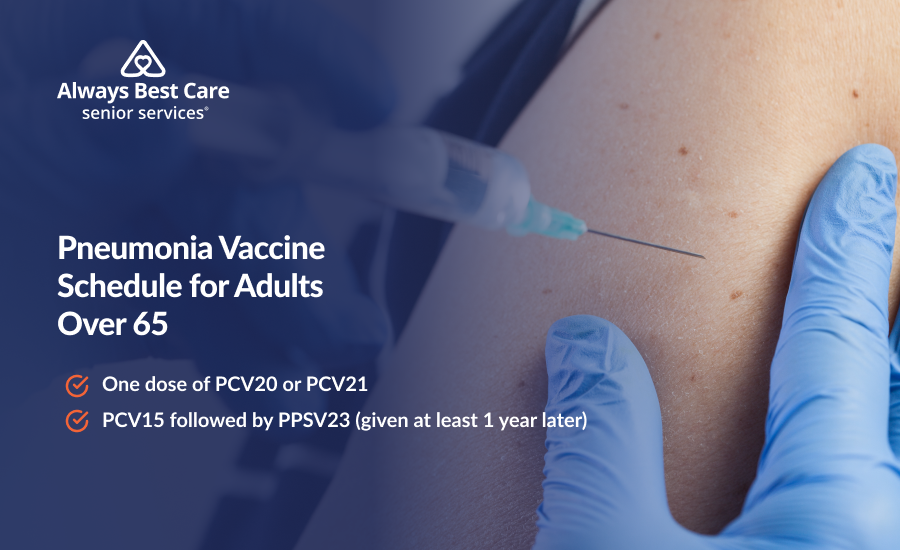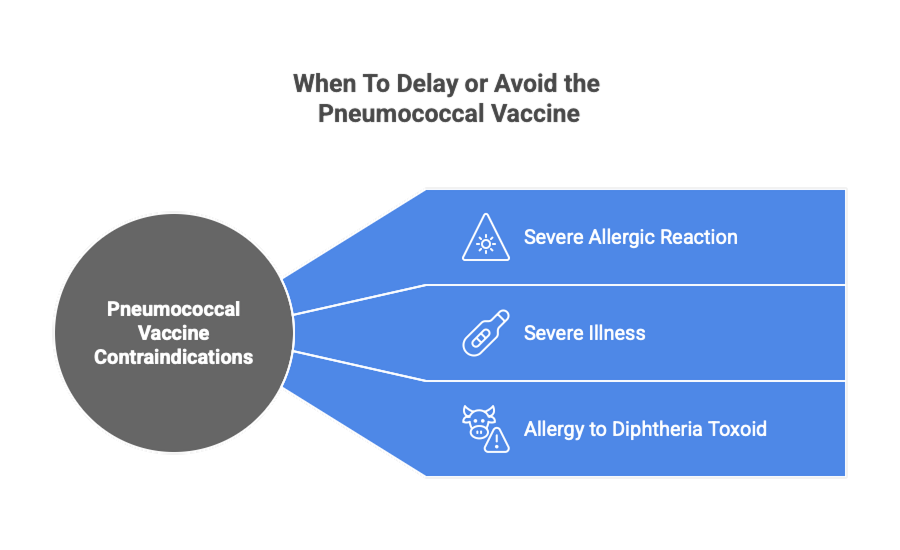101 Guide to Pneumococcal Vaccine [Prep Tips & FAQs]
![101 Guide to Pneumococcal Vaccine [Prep Tips & FAQs]](https://cdn.alwaysbestcare.com/wp-content/uploads/2025/08/pneumococcal-vaccine-hero-image.png)
Table of Contents
Pneumococcal Vaccine Explained: Key Takeaways
- The pneumococcal vaccine is the best protection for adults over 65 against pneumonia, meningitis, and bloodstream infections
- Vaccine schedules and timing vary based on age, health history, and prior doses
- For adults 65 and older, one or two doses can provide lifelong protection, depending on the vaccine type
As we get older, our bodies become more vulnerable to certain infections, especially those caused by Streptococcus pneumoniae, a bacterium that can lead to pneumonia and serious bloodstream infections.
For seniors, the pneumococcal vaccine can help prevent infection, prevent extended hospital stays, and life-threatening complications.
In this guide, we will:
- Explain why the pneumococcal vaccine is especially important for adults over 65
- Clarify how often seniors should receive the pneumonia shot
- Provide steps on how to help you prepare for your vaccination
- Address FAQs about the pneumococcal vaccine
What Is the Pneumococcal Vaccine?
The pneumococcal vaccine can help protect against illnesses caused by Streptococcus pneumoniae bacteria, commonly known as pneumococcus.
These bacteria can cause serious illnesses, including:
- Pneumonia: A lung infection that can be severe or even life-threatening, especially in elderly individuals
- Meningitis: An infection of the lining of the brain and spinal cord
- Bacteremia: A bloodstream infection
- Ear and sinus infections: More common but generally less severe
Why the Pneumococcal Vaccine Matters After Age 65
Adults over 65 face higher pneumococcal disease risk from age-related immune decline and chronic conditions, and vaccination greatly minimizes that risk.
While the CDC now recommends pneumococcal vaccination for all adults 50 and older who haven’t received it, age 65 remains a key time for many seniors to get protected.
For adults 65 and older, the current options are:
- A single dose of Prevnar 20 (PCV20) or PCV21 (Capvaxive)
- Prevnar 15 (PCV15) followed by Pneumovax 23 (PPSV23), typically spaced at least one year apart (or a minimum of eight weeks for certain high-risk conditions such as immune compromise, cerebrospinal fluid leak, or cochlear implants)
These schedules offer broad protection against the pneumococcal strains most likely to cause serious illness in older adults.
Benefits include:
- Reduced risk of hospitalization from pneumonia and invasive pneumococcal disease
- Strong prevention outcomes backed by decades of research
How Often Should You Get a Pneumonia Shot After Age 65?
If you’re being vaccinated for the first time at 65 or older, your clinician will recommend either:
- One dose of PCV20 or PCV21
- PCV15 followed by PPSV23, given at least one year later (or eight weeks later for certain high‑risk conditions such as immunocompromise or a cochlear implant).
If you’ve already had a pneumococcal vaccine, your next step depends on which vaccine you received and when.
You might need an additional dose to complete the series, or in some cases a PCV20 dose can be considered five or more years after a prior series.

How Long Does the Pneumonia Vaccine Provide Protection?
For most adults, one dose of PCV20 or PCV21, or completing the PCV15 followed by PPSV23 series, provides long-lasting protection.
Routine boosters aren’t usually necessary, but in some cases, your doctor might recommend another PCV20 dose five or more years later, depending on your health and the latest guidelines.
Debunking Common Myths About the Pneumonia Vaccine
Some older adults believe the pneumonia vaccine is a one-time shot, while others think it’s the same as the flu vaccine.
These misunderstandings can delay protection and increase the risk of serious illness.
To help keep seniors safe, it’s important to:
- Explain clearly that the pneumonia vaccine works differently from the flu shot
- Share that vaccine schedules can vary depending on a person’s age and health conditions
- Use easy-to-understand materials, such as handouts, charts, or simple visuals, during appointments
- Encourage seniors to ask questions and review their vaccine records with their healthcare provider
Pneumococcal Vaccine for the Elderly: Who Shouldn’t Get It
For older adults, the pneumococcal vaccine is safe and recommended for most people, but there are a few situations where it should be delayed or avoided.
Seniors should not get the pneumococcal vaccine if:
- They’ve had a severe allergic reaction to a previous dose of a pneumococcal vaccine or to any of its components (for example, anaphylaxis after a past shot)
- They are severely ill at the time of vaccination, such as having a high fever or a significant infection. In this case, vaccination is usually postponed until recovery
- They have a known allergy to diphtheria toxoid, used in some pneumococcal conjugate vaccines (PCV15 or PCV20)

What To Do Before Getting the Pneumococcal Vaccine
With the right preparation, your vaccine visit can be stress-free and effective.
Here’s what to keep in mind:
- Check your vaccine history in detail: Bring your vaccination card or records from your doctor or pharmacy. Your provider needs to know if and when you’ve had PCV13, PCV15, PCV20, or PPSV23 so they can plan the correct schedule.
- List your current health conditions: Be sure to mention any chronic conditions, such as heart disease, COPD, or diabetes, along with immune system disorders or recent surgeries, as these can influence when and which pneumococcal vaccine is recommended for you.
- Mention any allergies: Let your provider know about any allergies, especially if you’ve ever had a severe reaction to a vaccine, latex (found in some vial stoppers), or diphtheria toxoid, which is an ingredient in certain pneumococcal vaccines.
- Review your current medications: Medications like immunosuppressants, steroids, or chemotherapy can affect how well the vaccine works, so your doctor may recommend scheduling it at a specific time.
- Prepare your questions: Write down any questions you have, such as: “Which pneumococcal vaccine is right for me?” “How long will it protect me?” “Do I need both types?” and “What side effects should I expect?”
- Avoid vaccination during a serious illness: It’s fine to get the vaccine with a mild cold, but if you have a fever over 101°F or a serious infection, it’s best to wait until you’re fully recovered so your body can respond well to the shot.
- Coordinate with other vaccines: If you need the flu, COVID-19, shingles, or Tdap vaccines, ask if they can be given the same day to save trips.

What To Expect With the Pneumococcal Vaccine
The pneumococcal vaccine plays a key role in protecting you from serious infections.
Here’s what you might notice (and what’s completely normal) after vaccination:
- Mild, short-term side effects are common, such as a sore arm, fatigue, or a slight fever. These usually go away within a few days without treatment.
- Allergy precautions matter. Anyone who has had a severe allergic reaction to a pneumonia vaccine or one of its ingredients should tell their healthcare provider before getting another dose.
- Protection is still important for those with weakened immune systems. People with certain health conditions can benefit from the vaccine by following the CDC’s special guidelines.
- Can be given with other vaccines. The pneumonia shot is often administered at the same time as the flu vaccine or other adult immunizations.
- Timing matters. If more than one type of pneumonia vaccine is needed, doses are typically spaced at least one year apart, unless current medical recommendations suggest otherwise. In some high-risk cases, like people with weakened immune systems, doctors might recommend a shorter interval based on current CDC guidelines.
Get Personalized Support for Pneumonia Recovery With Always Best Care
While Always Best Care doesn’t provide vaccinations, we understand how difficult pneumonia and other pneumococcal illnesses can be, especially for older adults.
If your elderly loved one is recovering or needs extra help while managing ongoing symptoms, our compassionate caregivers are here to help.
We can:
- Assist with daily tasks
- Provide medication reminders
- Prepare nutritious meals
- Offer mobility support
Our team partners with families to develop a tailored care plan that supports medical needs, promotes recovery, and helps maintain independence.
Pneumococcal Vaccine: FAQs
Is the pneumococcal vaccine necessary?
Yes. It’s the most effective way to protect against serious pneumococcal infections.
If you’re unsure whether you need it, talk with your healthcare provider.
What are the serious side effects of the pneumonia vaccine?
Seek medical attention right away if you experience any of the following after your shot:
- Rash or itching
- Rapid heartbeat
- Difficulty breathing or swallowing
- Swelling of the hands, face, or mouth
Can I still get pneumonia after being vaccinated?
Serious reactions are rare, but the U.S. Vaccine Adverse Event Reporting System (VAERS) has recorded a few cases of lung problems, such as interstitial lung disease and interstitial pneumonia, after the polyvalent pneumococcal vaccine.
That said, the vaccine still greatly lowers your risk of severe illness.
Should I get the pneumonia vaccine if I’ve already had pneumonia?
Yes. The vaccine is still recommended for children under 2, adults 65 and older, and people of any age with certain chronic health conditions or weakened immune systems, even if they’ve had pneumonia in the past.
Can I get the pneumonia vaccine at the same time as other vaccines?
Yes. The pneumococcal vaccine can be given during the same visit as other vaccines, such as the flu shot or COVID-19 vaccine.
Your healthcare provider will decide the best timing based on your health.





